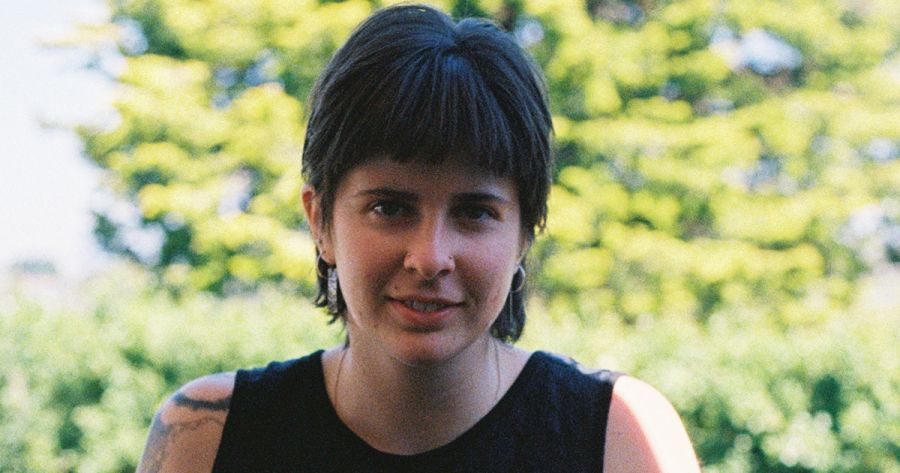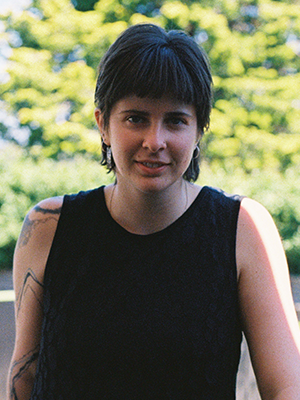
- Free Article: No
- Contents Category: Jolley Prize
- Custom Article Title: ‘Shelling’
- Review Article: No
- Article Title: Shelling
- Online Only: No
- Custom Highlight Text:
Phantom flutes ring in your ears, well past the finish of the music. The kind you get from a migraine or the neurotic howl of cicadas in the summer. The kind that hangs eerily at the back of your neck, a reminder of the thin veil separating real from imagined. The kind that makes your mind chase its own tail. It can’t be (but it is) but it can’t be and so on, into the silence that is not silence. Your father slides around in the back of the car. What slides around in the boot is not really your father but rather a shadow, or an echo or a remembering. Reminds you of shelling peas as a child. Pull out the orbs from between the fleshy green lips, eat the innards until the skin sinks in on itself into a hollowed husk. The body in the boot is just such a vessel, empty now that he has left, just epidermis and bones and irises that will break down into smaller compounds. Organic matter reduced to biology. And in the absence of soul, a peculiar cold sort of smell if a smell can be described like that. Metallic almost, like when you press your head to the concrete as a child and feel the vastness of the earth creep into you.
You pull into the town that is more scrapyard than housing. Nothing has changed and yet nothing is familiar here. An ache exists when returning here. Always an ache. The ache is an understanding you no longer fit somewhere, what once grew with you has become stagnant, tight. Although you were a nonfit even when you belonged. But then again you imagine most children don’t fit, they are a constantly growing entity, not given the cells to be able to make sense of it, already behind when finally fully formed. You left to the city as so many do, in a state of constant unease. Belonging to both city and country, cleaved in half with no full claim to either. But you couldn’t stay.
Eyes watch, you can feel them on your neck dancing with the flutes. You put diesel in the truck. Realise you need to eat although the thought makes you feel sick. You try not to think of chewing or shitting or anything else primal and alive. Feels somehow darkly sardonic. You order a burger. The waitress looks like a slut and you envy her faintly. She looks you up and down like she doesn’t envy you one bit. You’ve been driving a while. And you are odd and people sense that. Shuffle around it, uncomfortable. Move it to the side and never, never look it in the eye. And you’re aware of it, the way odd people are often aware of their peculiarities and yet can do little about them. Children used to smell it in the courtyard.
You leave.
Back in the car you unwrap the greasy thing from its papers. The car fills up with the smell of meat. You dry retch. You remember hearing that some religion or other didn’t allow for the eating of meat for days after a death in the family. The old Greeks down the road maybe. No wonder. You remove the soggy grey pink cut from the middle and throw it onto the street. You drive off. Somewhere along the road the thought occurs that that animal was perhaps a father, a son, a holy spirit. The burger is just sunken bread at this point with thin perspiring cheese and so much goddamn oil dripping over your goddamn lap. You pull over to eat it. Why do towns always overcompensate loneliness with grease? You want company, sit next to the old man. The urge to feed him like a child arises. Like a doll or some other pitiable creature. You feel maternal. You never had this feeling when life was a beating bird in his lungs. But death softens.
In life you were torn between feeling entirely ashamed, overwhelmed by his regression into childlike helplessness. And then a feeling of retribution. Of power and of holding it above him like a taunt. And then the guilt, the intellectualised realisation of your pathological retaliation. The cruelty of its nature.
And it was a quiet sad thing, the torments. Because he was an entirely different man at the end. The man whose eye you wanted for your little eye, was long gone, dementia and age stealing all malice and memory from his mind, fraying, circling around and around in nonsensical loops. Language itself disintegrated, and so there would have been no words for him to speak his anguishes to the world. Or for linguistic redress. Concepts disintegrated, so where once you were a daughter to a father you were now something else. He was a captive, growing backward into infancy. Into dependency. Into innocence. And although you were all grown women, you watched your sisters do the same. Find silent ways to punish him. He gave no defence. And none of you ever said anything to each other as to his condition beyond the empathetic. One time you saw your youngest sister strike him in anger. Later you discussed the taxes and pretended he wasn’t sitting in his chair. Life is cruel. And he’d been cruellest to her. The old man was smiling to himself as she left, shocked, her arm still raised. And although he may not have understood, and it had been the delirious notion of the crazed, it sometimes seemed almost a relief to him. Something agitated in his eyes that eased as each sister found a way to get her own. Perhaps there was always a little left of someone, even in the insanity. Perhaps although his mind had forgotten, his body remembered.
Now what is left of all that is slumped next to you.
You are exhausted at all the thoughts and sleep comes on like a toddler tugging heavy on your eyelids. Stubborn. Hard to argue. And what else is there to do? You’re on the roadside in the middle of nowhere. It doesn’t feel unsafe. You’re a middle-aged woman carting around her deceased father. Chances are, you’re the craziest they’ve got out here. You push the seats down and try and rearrange him so there’s room for you both.
He is heavy. You’re not sure how you managed to steal him. That time is not easily accessible to your mind, it darts away as soon as you come close. You catch glimpses that feel known and then everything feels eerie and your mind retreats. You try to hold your father in your sleep, but it is impossible to not feel the worlds between the living and the dead when you are so close. You move away so the cold and the metal don’t creep into you overnight. You cover him in a blanket and imagine he is a child once again underneath it. Only then can you sleep. Sleep is deep and blank, and you wake only hours later, still wrapped in dark. You’re stiff and sore and stale as the old man beside you. The car struggles to start. And then it roars. A cow moos somewhere in the gloaming, agitatedly, in response perhaps. The early morning air is crisp, and you know the way well.
The roads are gravel and winding and there are skid marks on the road from degenerate youth trying to feel things. You decide not to visit the old house, if it’s even still around. You can’t imagine he would want to return in such condition. Where other old and forgotten people longed to return to their lives, he left it behind when his body began to fail him. It was only shortly after, as if it knew he had given up, that his mind followed into chaos. He, with his last clarity in life, told the nurses if they took him back here on excursion in his weakness, he would put an axe in their neck. He’d built the place with that axe; you’d learned to chop wood with it. Careful, it’ll take your fingers right off. Two bucks a barrel load. Idyllic. You could buy sweets at the old servo down the road with it.
The old servo when you pass it now is ancient as ever. Sweets in the window, probably the same ones from all those years ago, preserved by their only sugary ingredient but hard by now in their glass jars. They were even hard back then. You’d be chewing all bus ride to school. Spit, the teacher would say, and it would still be a mostly formed pink worm, a little lumpy from hungry little teeth indents, lying in the bin. It was the kind of place starry-eyed university students might pull over to photograph, violently with new cameras. To capture a Zeitgeist that is not their own. If they even got this far out. But city people came further and further these days searching for misery to milk in the name of art. They’d find plenty here. And their photos would be flat, because you cannot capture the underbelly of misery, which is love, when you see only the outside of something. Take it captive and preserve it in a glass jar. And there was plenty of love here too if you knew where to look. And you do. You keep driving toward it.
When you reach the beach, the sky is red and the sea is foaming.
You see kites in the wind that aren’t there now but once littered the heavens above you. His voice is there once again, hold on tight it says, you’ll never see it again if you let go. But the current is strong, and it takes the kite from you. He understands. He holds your hand. Hands hold forgiveness. Another day you return, and he has made you a new kite.
Now you sit together in the back of the truck, watching the beach and the life you once shared pass in beautiful, painful segments before your eyes. And you hold his hand. Like you hope one day your daughters might hold yours. And you decide to stay around a while in this world. But you’ve gently let him go, into the next.



Comments powered by CComment